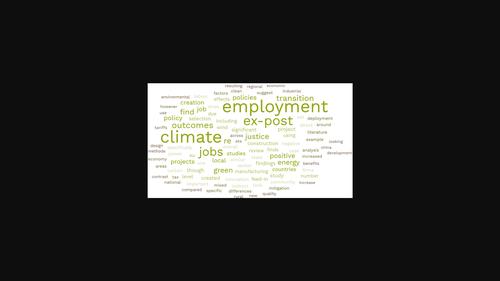当前位置:
X-MOL 学术
›
WIREs Clim. Chang.
›
论文详情
Our official English website, www.x-mol.net, welcomes your
feedback! (Note: you will need to create a separate account there.)
What do we know about the employment impacts of climate policies? A review of the ex post literature
WIREs Climate Change ( IF 9.4 ) Pub Date : 2022-08-11 , DOI: 10.1002/wcc.794 Catrina Godinho 1
WIREs Climate Change ( IF 9.4 ) Pub Date : 2022-08-11 , DOI: 10.1002/wcc.794 Catrina Godinho 1
Affiliation

|
Concern around the employment impacts of climate mitigation policies can be a contentious and politized issue, with potentially limiting implications for climate action. It persists despite a significant ex ante literature that suggests that aggregate effects will most likely be limited and net positive. This review analyses 60 papers assessing the employment impacts of climate policies ex post, in 20 countries and 2 country groups. Eight broad mitigation policies are covered: (1) emissions trading, (2) carbon taxes, (3) feed-in tariffs, renewable energy (4) procurement and (5) deployment, (6) green economy/jobs, (7) environmental regulation, and (8) other policies and regulations. The analysis confirms that employment impacts tend to be modest and net positive or neutral, but reveals that distributional outcomes can be uneven, disadvantaging certain groups and at times reinforcing existing inequalities. Additionally, lower quality jobs or weak labor market regulations may decrease the attractiveness of jobs created or increase job transition costs. These findings provide some justification for increased focus on how climate policies can ensure a “just transition of the workforce and the creation of decent work and quality jobs” stipulated in the Paris Agreement, but also suggest that climate action should not be delayed for fear of widespread negative employment impacts. Ex post assessments offer an important lens into the determinants of climate policy employment outcomes and should be advanced and harnessed in support of accelerated and just action.
中文翻译:

我们对气候政策对就业的影响了解多少?事后文献回顾
对气候减缓政策对就业影响的担忧可能是一个有争议和政治化的问题,对气候行动的影响可能有限。尽管有大量的事前文献表明总体影响很可能是有限的并且是净积极的,但它仍然存在。本综述分析了 20 个国家和 2 个国家组的 60 篇事后评估气候政策对就业影响的论文。涵盖八项广泛的缓解政策:(1) 排放交易,(2) 碳税,(3) 上网电价,可再生能源 (4) 采购和 (5) 部署,(6) 绿色经济/就业,(7) (八)其他政策法规。分析证实,就业影响往往是温和的、净正面或中性的,但表明分配结果可能不均衡,使某些群体处于不利地位,有时还会加剧现有的不平等。此外,较低质量的工作或薄弱的劳动力市场法规可能会降低所创造工作的吸引力或增加工作转换成本。这些发现为更多地关注气候政策如何确保《巴黎协定》规定的“劳动力的公正过渡以及创造体面工作和优质工作”提供了一些理由,但也表明气候行动不应因担心气候变化而推迟广泛的负面就业影响。事后评估为了解气候政策就业结果的决定因素提供了重要视角,应加以推进和利用,以支持加速和公正的行动。低质量的工作或薄弱的劳动力市场监管可能会降低所创造工作的吸引力或增加工作过渡的成本。这些发现为更多地关注气候政策如何确保《巴黎协定》规定的“劳动力的公正过渡以及创造体面工作和优质工作”提供了一些理由,但也表明气候行动不应因担心气候变化而推迟广泛的负面就业影响。事后评估为了解气候政策就业结果的决定因素提供了重要视角,应加以推进和利用,以支持加速和公正的行动。低质量的工作或薄弱的劳动力市场监管可能会降低所创造工作的吸引力或增加工作过渡的成本。这些发现为更多地关注气候政策如何确保《巴黎协定》规定的“劳动力的公正过渡以及创造体面工作和优质工作”提供了一些理由,但也表明气候行动不应因担心气候变化而推迟广泛的负面就业影响。事后评估为了解气候政策就业结果的决定因素提供了重要视角,应加以推进和利用,以支持加速和公正的行动。这些发现为更多地关注气候政策如何确保《巴黎协定》规定的“劳动力的公正过渡以及创造体面工作和优质工作”提供了一些理由,但也表明气候行动不应因担心气候变化而推迟广泛的负面就业影响。事后评估为了解气候政策就业结果的决定因素提供了重要视角,应加以推进和利用,以支持加速和公正的行动。这些发现为更多地关注气候政策如何确保《巴黎协定》规定的“劳动力的公正过渡以及创造体面工作和优质工作”提供了一些理由,但也表明气候行动不应因担心气候变化而推迟广泛的负面就业影响。事后评估为了解气候政策就业结果的决定因素提供了重要视角,应加以推进和利用,以支持加速和公正的行动。
更新日期:2022-08-11
中文翻译:

我们对气候政策对就业的影响了解多少?事后文献回顾
对气候减缓政策对就业影响的担忧可能是一个有争议和政治化的问题,对气候行动的影响可能有限。尽管有大量的事前文献表明总体影响很可能是有限的并且是净积极的,但它仍然存在。本综述分析了 20 个国家和 2 个国家组的 60 篇事后评估气候政策对就业影响的论文。涵盖八项广泛的缓解政策:(1) 排放交易,(2) 碳税,(3) 上网电价,可再生能源 (4) 采购和 (5) 部署,(6) 绿色经济/就业,(7) (八)其他政策法规。分析证实,就业影响往往是温和的、净正面或中性的,但表明分配结果可能不均衡,使某些群体处于不利地位,有时还会加剧现有的不平等。此外,较低质量的工作或薄弱的劳动力市场法规可能会降低所创造工作的吸引力或增加工作转换成本。这些发现为更多地关注气候政策如何确保《巴黎协定》规定的“劳动力的公正过渡以及创造体面工作和优质工作”提供了一些理由,但也表明气候行动不应因担心气候变化而推迟广泛的负面就业影响。事后评估为了解气候政策就业结果的决定因素提供了重要视角,应加以推进和利用,以支持加速和公正的行动。低质量的工作或薄弱的劳动力市场监管可能会降低所创造工作的吸引力或增加工作过渡的成本。这些发现为更多地关注气候政策如何确保《巴黎协定》规定的“劳动力的公正过渡以及创造体面工作和优质工作”提供了一些理由,但也表明气候行动不应因担心气候变化而推迟广泛的负面就业影响。事后评估为了解气候政策就业结果的决定因素提供了重要视角,应加以推进和利用,以支持加速和公正的行动。低质量的工作或薄弱的劳动力市场监管可能会降低所创造工作的吸引力或增加工作过渡的成本。这些发现为更多地关注气候政策如何确保《巴黎协定》规定的“劳动力的公正过渡以及创造体面工作和优质工作”提供了一些理由,但也表明气候行动不应因担心气候变化而推迟广泛的负面就业影响。事后评估为了解气候政策就业结果的决定因素提供了重要视角,应加以推进和利用,以支持加速和公正的行动。这些发现为更多地关注气候政策如何确保《巴黎协定》规定的“劳动力的公正过渡以及创造体面工作和优质工作”提供了一些理由,但也表明气候行动不应因担心气候变化而推迟广泛的负面就业影响。事后评估为了解气候政策就业结果的决定因素提供了重要视角,应加以推进和利用,以支持加速和公正的行动。这些发现为更多地关注气候政策如何确保《巴黎协定》规定的“劳动力的公正过渡以及创造体面工作和优质工作”提供了一些理由,但也表明气候行动不应因担心气候变化而推迟广泛的负面就业影响。事后评估为了解气候政策就业结果的决定因素提供了重要视角,应加以推进和利用,以支持加速和公正的行动。











































 京公网安备 11010802027423号
京公网安备 11010802027423号